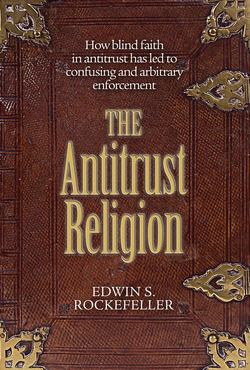Читать книгу The Antitrust Religion - Edwin S. Rockefeller - Страница 13
На сайте Литреса книга снята с продажи.
Law School Indoctrination in Elements of Antitrust
ОглавлениеAntitrust, as distinguished from the antitrust statutes that anyone can look up in the U.S. Code, is a mystical collection of persistent beliefs, not necessarily based in either fact or law or subject to control by Congress. Those beliefs are kept alive and transmitted to new generations by members of the antitrust community at bar association conferences and in law schools. At an Antitrust Masters Course in Sea Island, Georgia, one prominent member of the antitrust community told would-be masters paying a substantial attendance fee that “it is important to go beyond a list of ’do’s’ and ’don’ts’ and try to explain, on a deeper level, what the antitrust laws are all about.’’10
Antitrust masters must get beyond mere interpretation of legal requirements enacted by legislatures and administered by government officials because there are few fixed rules. They must sense at a “deeper level” the meaning of it all. The principal vehicle for transmission of this learning once was study of court opinions and casebooks containing them, but much court doctrine is now acknowl-edged by the antitrust community as out of date. “The traditional law school casebook misses the point of modern antitrust law and practice,” writes Waller.11
Compilers of casebooks have had to recognize the futility of trying to portray antitrust as a unified coherent system of law. Some have turned their courses into history courses presenting endless unanswerable questions.12 Some have attempted to distinguish themselves by “a balanced, diversified approach in presenting a wide spectrum of ideas regarding the goals and economic underpinnings of antitrust law” permitting the students “a larger perspective for individual choice.’’13 One trio of professors has produced a casebook titled Antitrust Law in Perspective: Cases, Concepts and Problems in Competition Policy14 in which they attempt to bring the student closer to reality. According to one book review, the authors “avoid formal categories” and “focus, instead, on economically based concepts.” The book contains an introduction to the study of antitrust law with “three themes’’: (1) how antitrust is “evolving from the analysis of discrete categories of behavior toward reliance on a set of core concepts,” (2) the “unfolding trend toward globalization of antitrust law,” and (3) “skills demanded of the antitrust lawyer.” The book is characterized as “a casebook for our time.’’15
A primary assumption behind years of antitrust teaching—that the antitrust laws provide a coherent, rational, and discoverable set of rules by which to evaluate behavior—can no longer be taken seriously. Yet that situation cannot be directly addressed. Antitrust law professors cannot admit that the antitrust community is administering a system of mere regulatory hunches by those who happen to be in decisionmaking positions, but that is the implicit thesis of the casebook for our time. To be an antitrust lawyer in our time, one must grasp “concepts” that are “evolving” to get to “a deeper level” of “what the antitrust laws are all about.” To develop that skill, one must study handbooks, manuals, guides, monographs, and reviews. The student must go beyond “formal categories of behavior” and “focus” on “core concepts” to understand how antitrust law is “evolving.” Meetings must be attended and lectures listened to. Indoctrination by elders of the community must be absorbed.
Students of antitrust are taught to answer questions in a language of metaphors. The notion is conveyed that the word game students are trying to learn and the concepts they are struggling to grasp are scientific descriptions of real-world phenomena, not just metaphorical descriptions of an imagined one. Numbing students’ minds begins by introducing the untranslatable word “antitrust,” which has no fixed content. Where the word came from and its lack of definition are not discussed. Professors of antitrust law, such as those at Harvard quoted in chapter 1, are at ease with the regal personification of antitrust implied in terms like “antitrust’s domain,” “the task of antitrust,” and “the targets of antitrust.’’16 Such professors are able to work with the explicit personification of antitrust by the use of active verbs in phrases like “antitrust seeks” and “antitrust does not take for granted’’17—implying that the professor is on speaking terms with the seeker or doer, and that someday the student may be, too.
Law school casebooks still present the material under a table of contents that suggests the subject matter can be organized into a coherent system of discoverable rules constraining the decision-maker, rather than only gaseous concepts that permit unpredictable results based on hunch or whim. Because “antitrust” has no fixed meaning, neither can “antitrust law.” Repeated use of the terms “antitrust” and “antitrust law” gives students the feeling that the terms have a definite meaning when they do not. That is not explicitly acknowledged. Instead, students are told that antitrust “is a unique blend of intellectual theory, social policy, political economy, microeconomics and law.’’18
